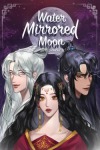
Dear Readers!
Thank you so much for stopping by to check out this story. If you like what you read, please feel free to vote/like.
It’s my first work, so I’m still in the process of learning and hope that some of the mistakes I make won’t detract too much from the content. For those who read it all the way to the end, thank you so much for sticking with it and for forgiving me for some of this!
First, I wanted to explain a bit about the style and setting:
I’m a huge fan of manga/manhua/manhwa, anime/donghua, C-drama, and Asian BL ,and draw a huge amount of inspiration from all these sources. You can also tell that the main character is a bit of an otaku…Anyway, this story came about because I got fed up reading transmigration/rebirth manhuas that had their reincarnated female doctor/assassin MCs take revenge (read revenge overkill) on everyone and their dog. Instead I wondered what I would do if I found myself spirited off to another world…and the result is this story.
Alright, about the style…When writing this, I envisioned some of the sentences in Chinese and then translated them back to English. As I am an English speaker of Chinese descent and not at all fluent, I apologize to Chinese speakers for my version of the translations. Also, if the diction feels awkward to an English speaker, it’s deliberate, so hopefully you find it fun instead of uncomfortable.
Anything that I think needs it will have a note for the original Chinese phrasing or if I’m using chengyu. Also, any obvious references to sources that don’t belong to me will also have reference notes so I can properly give credit where it’s due.
Now, a bit about the world construct, and this is rather important! It’s not ancient China - it’s a parallel universe that borrows stylistic elements and is in no way an accurate representation of Chinese culture. The characters probably also don’t act very Chinese…I’m ethnically Chinese, but not culturally Chinese, so I apologize in advance if I offend some folks by getting it wrong.
Some peculiarities of Tiansheng:
All the adult princes are of the first rank. So that you are not confused, they are not princes of the second rank even though they are sometimes referred to by two-character descriptive titles or nicknames (reflecting their personalities or traits – a quirk of Tiansheng). First rank princes can go in and out of the Palace at will, except Zhao Ling Ye…although he was never demoted (I won’t spoil) there is a reason why he cannot enter at will. The youngest, Zhao Ling Zhi, also doesn’t have the privilege of going in and out of the palace on his own as he isn’t of age yet.
In Tiansheng, if princes are born of a concubine below the rank of consort, then they are given descending ranks, but in this story, there are currently no princes of that rank. Only Zhao Ling Yao is born of a concubine under the rank of consort, but because she is the only living Princess, her father has conferred her as a first rank Princess. While most of the Princes do have formal titles that may relate and attach to a fief, I was looking more for style than for feudal correctness.
Regarding the imperial harem ranking system: I didn’t adhere to any particular dynastic convention, so the harem system is very loosely structured. In Tiansheng, the Imperial harem has three main divisions: this consists of one Empress and five consorts. Consorts are divided into two Imperial and three Noble consorts. At the time of this story, there are only three living consorts, two Imperial ranked, one noble ranked. Below the rank of consort is an unlimited number of concubines of varying ranks.
Imperial Princes are allowed a Princess Consort, a Secondary Consort, and an unlimited number of concubines. However, it is an unspoken rule among the Princes to not have a harem larger than the Emperor. Noblemen are allowed a primary wife, a secondary wife, and up to seven concubines. Common men are allowed one wife.
As there is no rule against it, on occasion, noblewomen can and do keep a harem of men. Likewise, there is no rule against same-sex pairings or same-sex harems, though in noble houses this usually causes some anxiety as there is still pressure to continue bloodlines. Even so, it’s still a feudal kingdom with all that implies…much to the annoyance of our modern heroine.
Also, when I use the term ‘Three Armies’…I literally mean three Armies. Normally the term is used to refer to the army in general, but Tiansheng actually has three standing armies: The Changping Beifang Chun [Northern Territory Army of Everlasting Peace] otherwise known as the Northern Army; the Anxi [Pacifiying West] or Western Army, and the Southern Imperial Army…which doesn’t have a fancy name as its leader is somewhat austere. An Emperor can keep up to six standing armies, but since it’s peace time, Tiansheng only has three.
Finally, I wanted to explain about the title:
‘Water Mirrored Moon’ or 水鏡月comes from the Chinese chengyu 鏡中的花,水裡的月 which literally translates as “flowers in the mirror, moon in the water”. Since the mirror world is a mirage or illusory reflection of the real world…the chengyu actually points to something beautiful, but unattainable, which is very apt to the main character’s situation where she is always striving towards the ideal, but the gap between expectation and reality is large, and sometimes things don’t turn out the way she expects. Obviously, the idea of the moon mirror also goes along with her “through the looking glass” transmigration/rebirth into the fantasy world that is Tiansheng.


